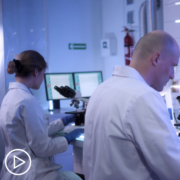How Driver Mutation Research Is Advancing MPN Treatments
How Driver Mutation Research Is Advancing MPN Treatments from Patient Empowerment Network on Vimeo.
How do driver mutations affect MPN care? MPN researcher Dr. Gabriela Hobbs shares an update on what’s being learned about the JAK mutation and how researchers are working towards targeted therapy for MPNs.
Dr. Gabriela Hobbs is a hematology-oncology physician specializing in the care of patients with myeloproliferative neoplasms (MPN), chronic myeloid leukemia, and leukemia. Dr. Hobbs serves as clinical director of the adult leukemia service at Massachusetts General Hospital. Learn more about Dr. Hobbs.
See More From MPN Clinical Trials 201
Related Programs:

|

|

|
Transcript:
Katherine:
There have been huge developments in the last 10 to 15 years in the field of MPN. So, I’d like to dig a little deeper. We hear about the common driver mutations in MPNs like JAK2, CALR, and MPL. How are these being studied , and what is being discovered?
Dr. Hobbs:
Yeah. So, it’s amazing how in the last 15 years really so much has been discovered. You know. The JAK2 mutation was first published out in 2005 and calreticulin in 2013. So, those are relatively recent discoveries. And I think a lot of efforts has been put into learning about what these mutations are doing and how they lead to disease. And so, we have the JAK inhibitors, which block the signaling through a pathway called JAK-STAT. And all of these mutations will activate that pathway within cells.
And so, many of the approved drugs, for example, ruxolitinib (Jakafi), fedratinib (Inrebic), and pacritinib (Vonjo), work on blocking that pathway.
But since then, we’ve also learned that there are other mutations and other pathways that are likely involved in the development of myeloproliferative neoplasms and also their progression. And so, what we’re seeing now is that many of the clinical trials that are being conducted don’t just target the JAK-STAT pathway or the pathway that’s influenced by these main mutations.
But also block other pathways to try to really block all the variant expression of signaling in the myeloproliferative neoplasms. And so, we’re trying to attack it by many different angles.
Katherine:
Yeah. Is there a possibility of specific targeted therapies at MPNs similar to those in AML such as FLT3 inhibitors?
Dr. Hobbs:
Absolutely. So, similarly to AML, we know that we have mutations in similar types of genes called tyrosine kinases. So, these are enzymes that are turned on and always active. And so, I think there is definitely hope that we can develop some targeted agents. For example, ruxolitinib or the other JAK inhibitors are similar. They’re tyrosine kinase inhibitors where they block an enzyme, specifically the JAK2 enzyme.
But I think that we can definitely do better and develop more specific inhibitors, for example, a molecule that just blocks the JAK2 mutation and not just every JAK2 molecule in every cell. Similarly to AML, there are mutations, for example, in enzymes called IDH.
And we have IDH inhibitors for AML. And there are some studies that are using IDH inhibitors for MPN. So, I think we’re going to continue to see more targeted therapies specific to the mutations that occur in MPN.










